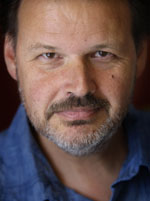Royal Decoration for Douwe Draaisma
On Friday 25 April 2014, Douwe Draaisma received Royal Decoration. Draaisma has been appointed Officer of the Order of Orange-Nassau.

Prof. D. (Douwe) Draaisma
Douwe Draaisma (1953) holds the prestigious Heymans Chair in the History of Psychology at the University of Groningen. His approach to psychology is completely different to the majority of psychology professors – where most of them concentrate on empirical scientific research, Draaisma concentrates on written historical sources. And where most of them concentrate on publishing in international scientific journals, he concentrates on writing books for the general public, a public interested in science in general terms but not necessarily academically trained. Without exception his books have become bestsellers and been translated into many languages. For example, the very successful Why Life Speeds Up As You Get Older (2001) has been translated into 19 languages, including Hungarian, Korean, Japanese, Arabic, Finnish, Danish and Standard Chinese. What marks Draaisma out is a unique combination of literary and academic gifts.
Thanks to his books, his international fame is undoubtedly much greater than that of most prominent scientists. Incidentally, he is also internationally renowned among scientists: he is the only Groningen psychologist who has managed to publish an article – not just once, but twice – in the prominent journal Nature.
Draaisma’s books have not only been translated and sold multiple times, they are also generally praised. For Why Life Speeds Up As You Get Older, Draaisma was awarded the 2002 J. Greshoff Prize for reflective prose, the 2003 Eureka! Prize for the best book in the field of knowledge and science, the literary Jan Hanlo Essay Prize (2003), and the NIP – (The Netherlands Psychologists’ Institute) – Van Gorcum Media Prize (2003) for eminent publications in the field of psychology. The book is also internationally renowned. The English translation was shortlisted for the prestigious Aventis Prize (2005), awarded by the Royal Society to the best and most accessible book in the field of science, a remarkable performance for a work by a Dutch author.
His subsequent books Disturbances of the Mind (2006), De heimweefabriek; geheugen, tijd en ouderdom [The homesickness factory; memory, time and ageing] (2008) and Vergeetboek [Forgetfulness book] (2010) have been highly praised by critics. For example, the NRC newspaper wrote the following about De heimweefabriek: ‘Draaisma describes old age and its inconveniences subtly and in a gripping style’, and with regard to Vergeetboek it said: ‘In Vergeetboek Draaisma once again demonstrates how talented he is at combining literary and scientific sources in a way that is both original and elegant.’
Draaisma is not only a popular writer, he is also frequently invited to give lectures and interviews and to appear in radio and television shows. It’s hardly surprising – his enthusiasm and erudite way of speaking dovetail perfectly with his writing style, and as a result his students think the world of him. Few Dutch academics play such an important role in the promotion of intellectual debates in society as Draaisma. He is an iconic figure in both science and society.
More news
-
20 January 2026
Alcohol, texting, and e-bikes
-
19 January 2026
Digitization can leave disadvantaged citizens in the lurch
